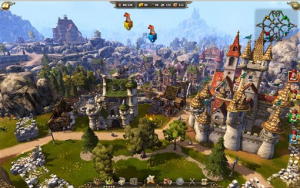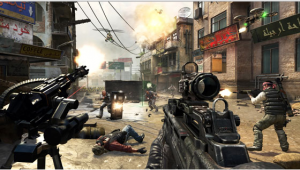As hinted at in my last post about the digital age, while the game industry has made numerous leaps and bounds thanks to moving away from a traditional store format, things have not gone smoothly.
Steam has certainty done more good than harm, but looking at publishers and developers as a whole, the digital transition has also created some problems.
Lost of Consumer Control:
Since day one of Steam, the biggest criticism of digital platforms has been the lost of ownership of video games. Once you have signed up for a service like Steam, your CDs became invalid in place of owning licenses for your PC titles.
In the process, the secondary market for used PC game sales has all but dried up. But the bigger problem has been developers and publishers wanting even more control and not just with multiplayer games.
When Uplay was first released, it required an always on internet connection regardless of the game that you were playing. Losing your connection at any time would stop your game until the internet was restored. This was eventually changed but cost both Ubisoft and its various properties a major lost of sales.
EA tried to do the same thing with Sim City 5 and claimed that it was vital to the gameplay and social aspect. However after release, people cracked the game and discovered that you could play it without the internet requirement and that EA was lying.
Worse still was that for the first month, Sim City 5 suffered from connectivity issues with many people unable to even play the singleplayer due to problems with the servers.
Speaking of servers and EA, another issue with games being tied to online services is that it affects the lifespan of the title based on popularity. In the 90s and early 00s, for games with multiplayer, the developers usually turned to a third party service to handle server support and connectivity issues like Gamespy. But with developers now maintaining and footing the bill, what happens when they don’t want to pay anymore?
In EA’s case, they shut down the servers for their older titles and effectively cut out half of their games. Now it’s expected to happen in annual sports titles where every year a new version is released for the fans. But then we have cases like Battle For Middle Earth 1 and 2 where there were no new games coming out.

UbiSoft’s insistence for always online DRM hurt the sale of many of their PC properties like The Settlers 7.
Because of EA’s insistence to make all multiplayer server based and not include peer to peer, those two games were killed because of EA not wanting to maintain them.
This is why a lot of people (including me) are hesitant about paying for Sim City 5 at this point. Because they tied the entire game into their servers, if they decide to cut the server support, there goes the game.
As another example, the game DarkSpore from EA required an online connection for singleplayer did not worked for at least 2 months and EA was not doing anything about it. It wasn’t until the game was pulled from Steam that EA fixed the issue… in about a day.
This lost of consumer control has been primarily on the PC, but with consoles becoming more online oriented, the ability for developers and publishers to control game content has grown.
The simplest example is on disc DLC: where the developers create content that is all there, but is locked behind an additional purchase. While that is a basic example, the fight against used game sales is when things get complex.
For the last few years companies like EA, Activision and others locked major content behind a onetime use DLC code. The purpose was that in order to get the full game, users had to buy a new copy of the game, or spend additional money on top of their used game cost.
EA has recently rescinded but there hasn’t been any such news from the other major publishers. As it stands we don’t know how publishers will take this concept further with the release of the Xbox One and PS4.
Originally Microsoft had restrictions on both used game sales and always online connection requirements built into the Xbox One. As we know, after enough public backlash Microsoft has gone back on those statements. However, they are still allowing publishers and developers control over their content.
The need for control comes from dwindling profits, part of which is from the excessive funding we see in AAA titles and the other part comes from a major shift in the monetary model.
Sweating out Sales:
In my last post on the digital age, I brought up the increase in game sales as a major positive for consumers, but on the flip side, developers and publishers aren’t too happy.
Video games regardless of platform don’t retain their value for as long as they used to. The only exceptions are the big name games from the major developers: Nintendo, Activision and EA for example.
Because games are going on sale so quickly, gamers have a wide variety of games to choose from at lower prices. Meaning that the market is flooded with a variety of titles, unlike in the early 90s where you could go several months without any new games at all.
In today’s day and age despite what publishers and developers tell you, it’s very hard to justify spending $60 or more on a single game. Even $50 is pushing it, unless the developers have one hell of a pre-order bonus.
Again, this is great for the consumers, but not so great for the developers. When your game cost several million dollars to make, having people who will only buy it for $10 or less will not help recoup that cost. In order to compensate, we have seen developers embrace micro transactions as an alternative.
These days, content like new costumes, multiplayer maps or even just cheat codes that were once free, are now being taken out and sold by the developers.
What that also means is that developers have taken to a “release early, patch later” attitude.
This has affected both the quality of games at release and the additional cost down the line. This ironically, drives consumers even further to wait for game sales as they can usually acquire the “complete edition” of the game with all the additional content at a fraction of the cost.
The mobile market is not helping game titles retain their value, with many free to play games on the platform or .99 cent games. This in turn is giving the general consumer even more cheaper options and further widens the gap between the cheaper games and full retail.
The digital age has done wonders for connecting us together and at the same time allowing companies to control our products and monitor our activities. There has been a rapid advancement in technology and development which the rest of the world and governments haven’t caught up to yet.
As the world continues to become wired, we can only wait and see as to the full ramifications of the digital age.


